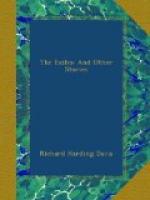Mrs. Carroll came toward Holcombe with her spear pointed dangerously high; she stopped at his side and drew in her rein sharply. “Why don’t you get up? Are you hurt?” she said. “Wait; lie still,” she commanded, “or he’ll tramp on you. I’ll get him off.” She slipped from her saddle and dragged Holcombe’s pony to his feet. Holcombe stood up unsteadily, pale through his tan from the pain of the fall and the moment of fear.
“That was nasty,” said Mrs. Carroll, with a quick breath. She was quite as pale as he.
Holcombe wiped the dirt from his hair and the side of his face, and looked past her to where Miss Terrill was surveying the dead boar from her saddle, while her pony reared and shied, quivering with excitement beneath her. Holcombe mounted stiffly and rode toward her. “I am very much obliged to you,” he said. “If you hadn’t come—”
The girl laughed shortly, and shook her head without looking at him. “Why, not at all,” she interrupted, quickly. “I would have come just as fast if you hadn’t been there.” She turned in her saddle and looked at him frankly. “I was glad to see you go down,” she said, “for it gave me the first good chance I’ve had. Are you hurt?”
Holcombe drew himself up stiffly, regardless of the pain in his neck and shoulder. “No, I’m all right, thank you,” he answered. “At the same time,” he called after her as she moved away to meet the others, “you did save me from being torn up, whether you like it or not.”
Mrs. Carroll was looking after the girl with observant, comprehending eyes. She turned to Holcombe with a smile. “There are a few things you have still to learn, Mr. Holcombe,” she said, bowing in her saddle mockingly, and dropping the point of her spear to him as an adversary does in salute. “And perhaps,” she added, “it is just as well that there are.”
Holcombe trotted after her in some concern. “I wonder what she means?” he said. “I wonder if I were rude?”
The pig-sticking ended with a long luncheon before the ride back to town, at which everything that could be eaten or drunk was put on the table, in order, as Meakim explained, that there would be less to carry back. He met Holcombe that same evening after the cavalcade had reached Tangier as the latter came down the stairs of the Albion. Holcombe was in fresh raiment and cleanly shaven, and with the radiant air of one who had had his first comfortable bath in a week.
Meakim confronted him with a smiling countenance. “Who do you think come to-night on the mail-boat?” he asked.
“I don’t know. Who?”
“Winthrop Allen, with six trunks,” said Meakim, with the triumphant air of one who brings important news.
“No, really now,” said Holcombe, laughing. “The old hypocrite! I wonder what he’ll say when he sees me. I wish I could stay over another boat, just to remind him of the last time we met. What a fraud he is! It was at the club, and he was congratulating me on my noble efforts in the cause of justice, and all that sort of thing. He said I was a public benefactor. And at that time he must have already speculated away about half of what he had stolen of other people’s money. I’d like to tease him about it.”




